In this Dec. 23, 2014 file photo, Japan's Emperor Akihito waves to well-wishers as he and family members appear on the balcony of the Imperial Palace during the emperor's 81th birthday in Tokyo. Japanese will tune in to Emperor Akihitoâs rare video message Monday, Aug. 8, 2016 following reports that he would abdicate in the next few years, which initially came as shock but which many people appeared to have welcomed as a deserved rest for the 82-year-old beloved monarch. (AP Photo/Eugene Hoshiko, File)
The Associated Press
TOKYO (AP) - Japanese will tune in to Emperor Akihito's rare video message Monday following reports that he would abdicate in the next few years, which initially came as shock but was welcomed by many as a deserved rest for the 82-year-old beloved monarch.
In the pre-recorded message, Akihito will talk about his duties as a "symbol emperor" as stipulated by the constitution, palace officials said. He will most likely avoid the explicit expression of abdication, which would involve political and legal procedures that he is not allowed to discuss.
Akihito still works, though his aides have shifted some of his duties to Crown Prince Naruhito - the elder of his two sons and most likely successor. Yet, Akihito has referred to his old age in recent years, admitting to making small mistakes at ceremonies. During the Aug. 15, 2015, anniversary of the end of World War II, Akihito started reading a statement when he was supposed to observe a moment of silence.
After the initial surprise, the public warmly welcomed the reported abdication plan, saying the hard-working emperor deserves to enjoy his long-overdue retirement. Lifting the abdication ban, a practice inherited from the prewar constitution, would also bring the imperial life closer to the public.
"Changing that will reflect the reality of Japanese society first of all, the way that almost all people here feel about working and life and career building," said Robert Campbell, a University of Tokyo professor and expert on Japanese history and culture.
According to a nationwide telephone survey by Kyodo News agency this month, nearly 90 percent of the respondents said Akihito is given too much work, while more than 85 percent said an abdication should be legalized as an option to Akihito and his successors.
Akihito has reportedly told palace officials and his families that he doesn't wish to cling to his title with drastically reduced responsibility or by arranging a substitute, and his two sons have accepted the idea. The quiet discussion reportedly started about five years ago, around the time he had health problems - he was hospitalized for bronchitis in 2011, and had heart bypass surgery in 2012.
Palace officials quickly denied the report, because the emperor is not supposed to say anything that would cause a change to the existing system, including his constitutional status.
Experts and media have speculated that Akihito will seek to abdicate while he is still in good health so he can monitor Naruhito, who is seen not quite ready for succession.
"If he does decide to abdicate, I believe that one of the reasons may be that he wants to oversee the change in reign ... in peaceful and successful way," Campbell said.
Akihito ascended to the throne in 1989 after the death of his father, Hirohito, who was considered a deity until Japan's defeat in the World War II, fought in the name of the emperor.
Akihito brought the cloistered imperial family closer to the public and broke with other traditions, including his marriage to a commoner. He has repeatedly said he respects Japan's postwar pacifist constitution and is committed to his status as the symbol and the unity of the people, not the sovereign.
Some speculate that Akihito's abdication may be an attempt to put a break on Prime Minister Shinzo Abe's plan to rewrite the constitution. Abe and his ultra-conservative supporters want to scrap a part of the war-renouncing article and upgrade the emperor to the sovereign again.
__
Follow Mari Yamaguchi at https://www.twitter.com/mariyamaguchi
Find her work also at http://bigstory.ap.org/content/mari-yamaguchi
FILE - In this Aug. 15, 2015 file photo, Japan's Emperor Akihito, accompanied by Empress Michiko, leaves after delivering his remarks during a memorial service at Nippon Budokan martial arts hall in Tokyo. Akihito still works, though his aides have shifted some of his duties to Crown Prince Naruhito, the elder of his two sons and most likely successor. Yet, Akihito has referred to his old age in recent years, admitting to making small mistakes at ceremonies. During the Aug. 15, 2015, anniversary of the end of World War II, Akihito started reading a statement when he was supposed to observe a moment of silence. (AP Photo/Shizuo Kambayashi, File)
The Associated Press
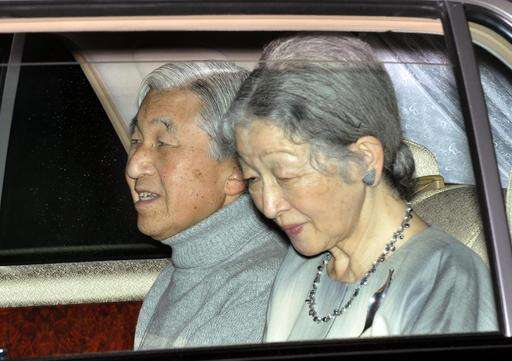
In this Nov. 6, 2011 photo, Japanese Emperor Akihito accompanied by Empress Michiko leaves the Imperial Palace to be admitted to a hospital, in Tokyo. Akihito has reportedly told palace officials and his families that he doesn't wish to cling to his title with drastically reduced responsibility or by arranging a substitute, and his two sons have accepted the idea. The quiet discussion reportedly started about five years ago, around the time he had health problems, he was hospitalized for bronchitis in 2011, and had heart bypass surgery in 2012. (Kyodo News via AP)
The Associated Press
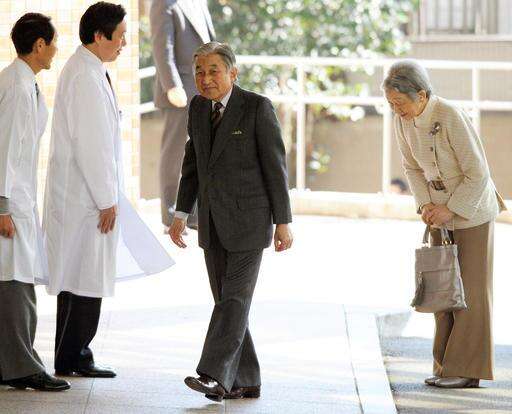
In this Feb. 17, 2012 photo, Japanese Emperor Akihito, center, accompanied by Empress Michiko arrives at a hospital to be admitted, in Tokyo. Akihito has reportedly told palace officials and his families that he doesn't wish to cling to his title with drastically reduced responsibility or by arranging a substitute, and his two sons have accepted the idea. The quiet discussion reportedly started about five years ago, around the time he had health problems, he was hospitalized for bronchitis in 2011, and had heart bypass surgery in 2012. (Kyodo News via AP)
The Associated Press
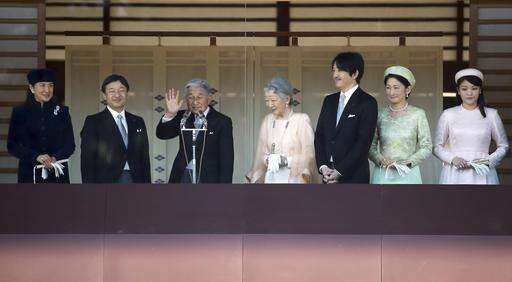
In this Dec. 23, 2014 file photo, Japan's Emperor Akihito, third from left, accompanied by his wife Empress Michiko, fourth from right, and their family members, wave to well-wishers as they appear on the balcony of the Imperial Palace to mark the emperor's 81th birthday in Tokyo. From left to right are: Crown Princess Masako, Crown Prince Naruhito, Akihito, Michiko, Prince Akishino, Princess Kiko and Princess Mako. Japanese will tune in to Emperor Akihitoâs rare video message Monday, Aug. 8, 2016 following reports that he would abdicate in the next few years, which initially came as shock but which many people appeared to have welcomed as a deserved rest for the 82-year-old beloved monarch. (AP Photo/Eugene Hoshiko, File)
The Associated Press
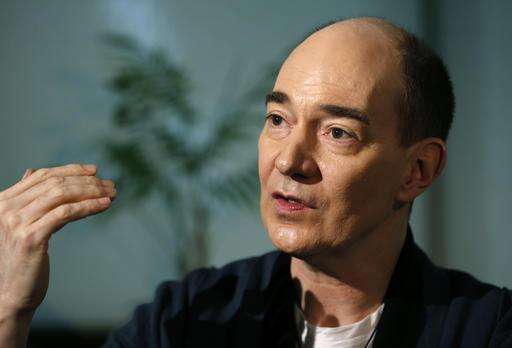
In this Aug. 2, 2016 photo, Professor Robert Campbell of the University of Tokyo speaks during an interview in Tokyo. Japanese will tune in to Emperor Akihitoâs rare video message Monday, Aug. 8, 2016 following reports that he would abdicate in the next few years, which initially came as shock but which many people appeared to have welcomed as a deserved rest for the 82-year-old beloved monarch. "Changing that will reflect the reality of Japanese society first of all, the way that almost all people here feel about working and life and career building," said Campbell. (AP Photo/Shuji Kajiyama)
The Associated Press
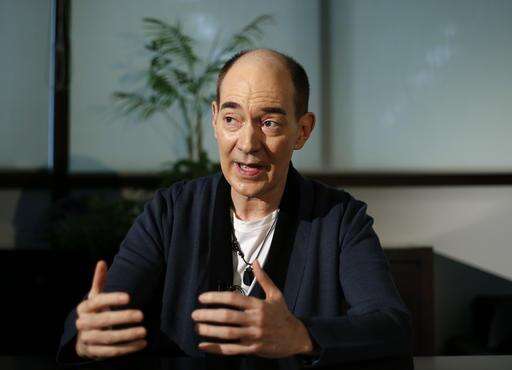
In this Aug. 2, 2016 photo, Professor Robert Campbell of the University of Tokyo speaks during an interview in Tokyo, Tuesday, Aug. 2, 2016. Japanese will tune in to Emperor Akihitoâs rare video message Monday, Aug. 8, 2016 following reports that he would abdicate in the next few years, which initially came as shock but which many people appeared to have welcomed as a deserved rest for the 82-year-old beloved monarch. "Changing that will reflect the reality of Japanese society first of all, the way that almost all people here feel about working and life and career building," said Campbell. (AP Photo/Shuji Kajiyama)
The Associated Press